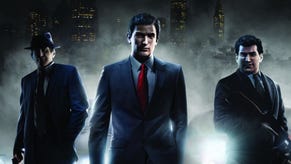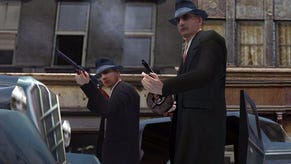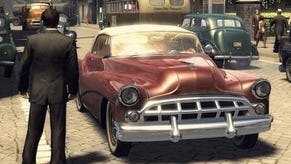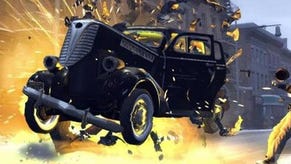Mafia
Lost heaven or found hell?
Like everything else Illusion Softworks is responsible for, Mafia is a flawed classic. For many, the ever-present niggles and frustrations are too much to bear, and they'll shout from the rooftops about how much they despise it. You never have to look too deeply to recognise the fundamental design issues that conspire to ruin its chances of being remembered as a masterpiece. So how is it that an equally vocal band of loyal supporters rank this mission-based driving epic amongst their favourite ever games? Is it the grand cinematic atmosphere, or are they just blind in their praise and more forgiving than a priest?
Pleasure/pain
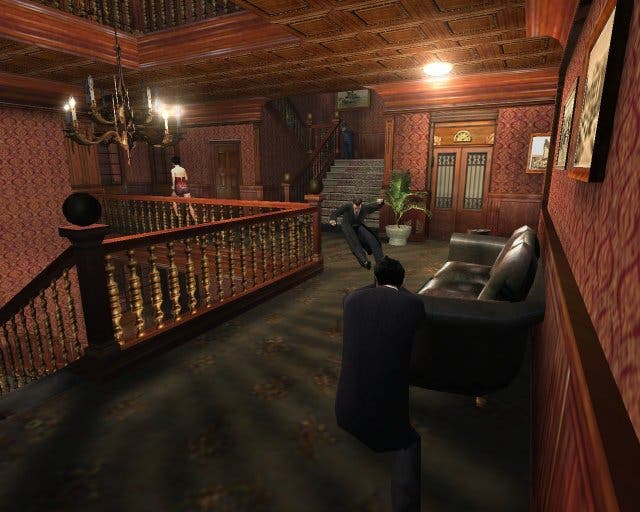
Somewhat annoyingly for those of you seeking confirmation for the respective arguments, I sit somewhere between the two camps - recognising both arguments and both enjoying the shining excellence on show, and rueing the crushing disappointment of the many areas where Illusion has let us down badly. It's one of those games you can simultaneously love and despise in equal measures, and in a sense there's a greater temptation to slam it all the more because the disappointment you feel is heightened by the feelings of what could have been.
But before I get overly distracted by this particular nest of vipers, let's concentrate on what this long-overdue PS2 conversion offers. In a broad sense, it's the exact same 22-mission tale of Tommy Angelo, a cabbie-turned gangster retelling how he got mixed up with the Salieri mob back in prohibition-era 1930. Told via a series of consistently excellent cinematic flashbacks, the story gradually unfolds over the next eight years, with the missions based around the key events that occur during that time.
Seeing as it's set in the 30s, the cars of the era are all slow, heavy, clunky beasts with terrible handling, and one of the chief criticisms of the PC original was just how faithfully Illusion translated the awful driving-through-treacle-while-towing-a-bus sensation of being behind the wheel of these monsters. To that end, the conversion deals with this basic issue by making them a little nippier than they were in the PC, meaning you don't get stuck trying to go up hills, and has also upped the speed limit from 40 to 60mph, which also makes the regular spirit-sapping journeys to and from Salieri's bar much less of a chore than they undoubtedly were in the original.
Race issues
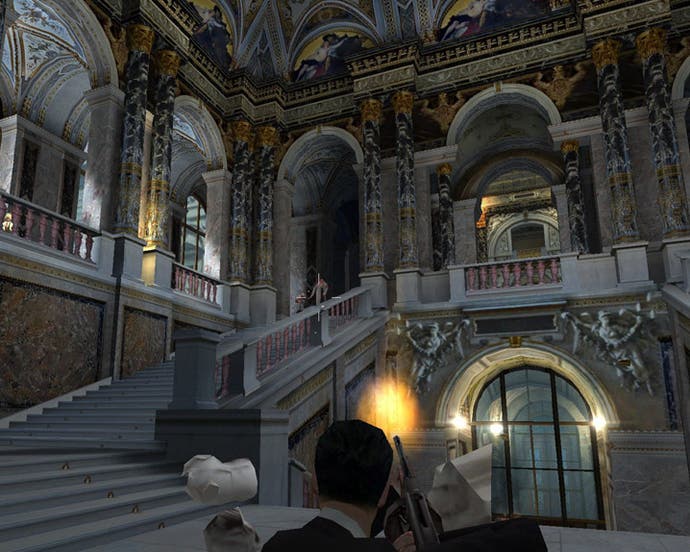
Also, the handling is much more assured than previously, so you're not constantly rolling the car, although it's still clunky enough to cause a few problems if you decide to floor it. The other irritating driving-related issue - the over zealous cops busting your balls for every minor traffic transgression - is also not so much of a hitch these days. Running red lights no longer bothers then, and they can easily be outrun if you break the speed limit or happen to crash in front of them. Not only that, they give up chasing much sooner, and Mafia's definitely a lot more fun because of it.
In some senses the controls fit the joypad like a glove, and both in-car and third-person action feels far more intuitive. Targeting and combat, however, are a mess, with no feeling of precision possible, and no option for auto-aim to balance out the lack of mouse aiming. Instead, Illusion has merely made it slightly easier to kill the enemy, with most requiring no more than three bullets from a Tommy gun, or a similar amount from the best pistol. In certain sections, enemies have also been stripped of grenades, so it's clear that Illusion has at least tried to address some of the more insanely difficult sections.
One of the more ridiculous levels on the PC - Race Day - has also been made much less of a spirit-sapping exercise. Thankfully, difficulty levels have been introduced to this previously heinous mission, from Very Easy, right up to Hard, and for that we're extremely thankful. I still have sleepless nights cursing that evil level, and thank goodness Illusion had the foresight to make it more playable. It's still no walkover -featuring the same unforgiving handling, but at least it won't keep you occupied for hours unnecessarily.
Pop-up profanity
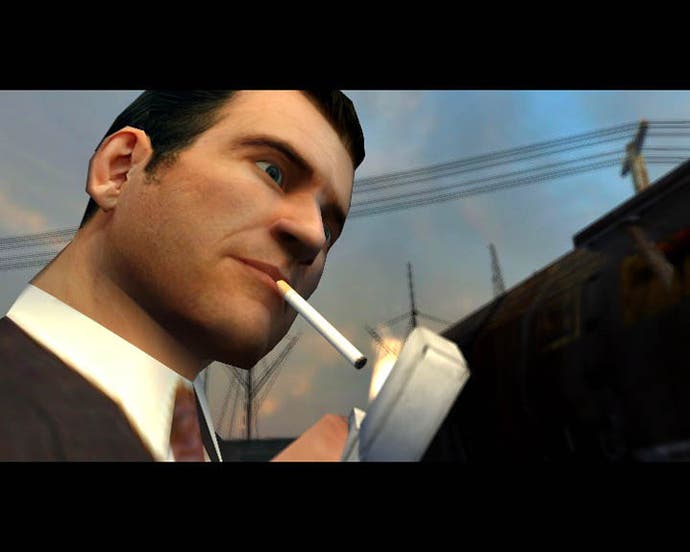
In other areas, Illusion giveth with one hand and taketh away with the other. Although it has added the fairly superfluous and unenjoyable Race mode (with the option to race various city-based circuits in single race or Championship mode), it has ditched the Extreme Free Ride mode that opened up once you'd finished the PC version. Quite why is difficult to fathom as it would have extended the lifespan of the game far longer than the throwaway Race mode, but there you go.
But what will really strike anyone who plays this is how technically unimpressive much of Mafia is. Pop-up and draw distance issues that we haven't seen since the PSone era and Driver 2 rear their extremely ugly head, along with a sluggish frame rate that in this era of boundary pushing simply isn't acceptable. Driving across any one of the many bridges highlights the issue dramatically, with entire skyscrapers suddenly popping up into view (not even fogging into view - literally drawing up the length of the screen hideously), while cars judder their way past as the game engine struggles to keep up. It's a mess. The PC original certainly suffered a fair bit from this too, if I recall, but literally everybody who walked into the room while I was playing winced at the spectacle and lamented that it didn't look good.
Literally all the visuals in the game, apart from the excellent sampled cut-scenes, have been significantly downgraded for the PS2, with texturing almost entirely absent for the most part on everything from the locations to the character models (especially the rough looking pedestrians with comical facial detail). The exterior building look flat, featureless and are cut into regular uninspiring blocks, while the cars themselves lack the shine and detail so (overly) obvious on the PC. Sometimes the game will surprise you with a lush interior location, but for the most part it's not the game we remember, and certainly not up to the visual standards set by every other game of this ilk on the PS2. In 2000 this would have been fine; in 2004 it looks shoddy.
Save the day
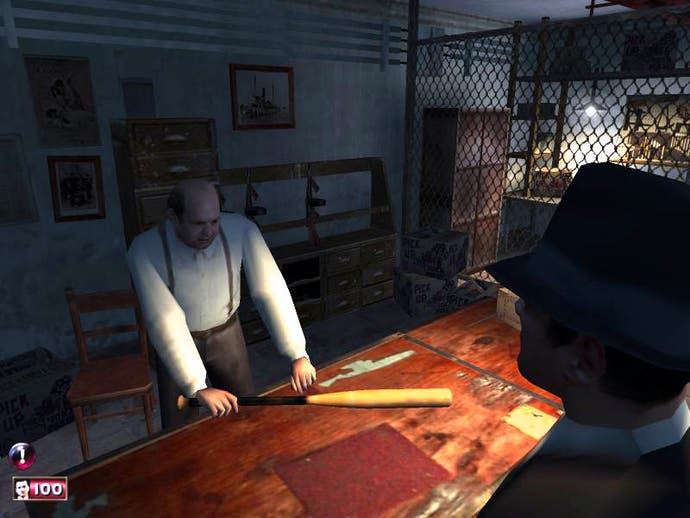
Load times, while not that noticeable when things are going well, can also be intrusive during the harder missions where you're forced to make regular restarts. As in the original, the checkpoint saves are often unsympathetically placed, sometimes not - there seems to be little rhyme or reason to the logic. Much of the time the game does the right thing and will start you from a decent mid-level point, but others will force you to do everything right from the beginning, often requiring the skipping of a cut-scene then a long trudge (and possibly another cut-scene), and maybe even a series of fire-fights before you can get going again. When the game really turns up the heat, you can feasibly find yourself repeating the same sections for literally hours before you finally succeed - the airport mission, for example, is undoubtedly where the game peaks in bloody-minded Rambo-esque difficulty, offering one badly-placed health recharge to last you the whole distance. And it can be terrifically annoying to discover that despite your good performance, you fail the mission because Paulie or Sam - your AI buddies on many of the missions - decide to blunder into a shotgun blast.
Talking of AI, the enemy in general seem to have an unerring eye for accuracy that would challenge even Max Payne himself for speed. Time after time, even when you know exactly where enemies are going to spawn, their deadly aim will nail you the split second you turn a corner - often from a distance that would make such feats practically impossible. Bizarrely, this version also allows you to cheat almost as much, making it possible to nail a sniper on gun tower over 100 feet away with a couple of shots from a pistol. Now that's marksmanship. In fact, you'll quickly learn that a pistol is your best friend - capable of nailing almost anyone from distance even when your cursor isn't quite on target. Yet using a shotgun requires pinpoint accuracy even up close - inconsistencies that will annoy the hell out of you when it really counts.
But then even if you are perfectly proficient at killing and can adapt - as I did - to the overly twitchy aiming system, you'll probably still find yourself tripped up by the lack of signposting during a mission. Most of the time Mafia spells out what you have to do, yet on several occasions tasks you with something vague like 'Kill (whoever)' or 'Escape' but give you no clue as to what you're supposed to do in order to carry out your objectives in the first place. It's all 'easy when you know how' type stuff, but until you're back on track you'll scream yourself hoarse questioning whether there's a bug (and there are some howlers) - and what's frustrating is that all of it could have been solved with proper testing and a line of text to properly detail your mission objectives. Basic fundamental stuff.
Death to them?
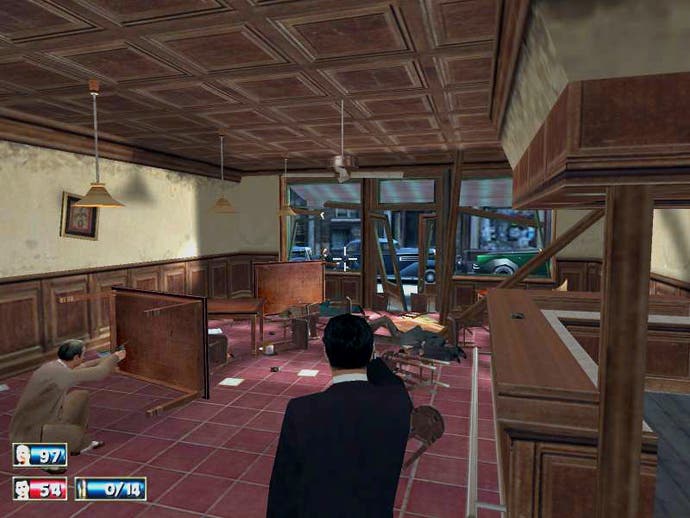
With all the bad stuff out of the way, you'd think I'd want Mafia's designers to have some concrete boots fitted. But much like Illusion's other terrifically annoying games like Hidden & Dangerous 1 and 2, and Vietcong/Fist Alpha, I can't help but stick up for them for the things that they do so right. In common with all these other games, Mafia's an easy target - a game you could spend an hour just airing all your grievances, while failing to acknowledge the good points. And in Mafia's case there are plenty of great moments that go some way to repairing the damage done.
While we're not playing Mafia for its narrative alone, it'd be unwise to overlook its significance in this case. When most games barely even bother trying to tell a worthwhile story, Mafia stitches the whole package together with possibly one of the finest game stories devised. Not only is it well voice-acted, charmingly scripted and brilliantly executed with supremely detailed facial detail, but using the familiar flashback route manages to constantly surprise you with who you can trust and their motives. Any game that can keep you playing almost because of its story alone is a rare beast, but Mafia almost manages to achieve that.
Even the between mission banter while you're driving along keeps things interesting, and the use of Django Reinhardt, one of the finest Jazz guitarists, as a soundtrack is an inspired choice - although admittedly a little repetitive after 20 hours of play (he says, with the jolly jingles still bouncing through his head). And the majority of the missions themselves are extremely cinematic affairs that had my heart pounding in my chest. It comes back to that hard to fathom X factor - the atmosphere. For large parts of the game, Mafia does an excellent job of conjuring a unique impression of a fascinating lost era that offers incredible potential.
This could be heaven...
And I guess there lies the rub. The bottom line is that your enjoyment of Mafia depends on how much you're prepared to fill in the gaps of this game's enormous potential. The truth is, it's not nearly as good a game as we want it to be, lacking so many elements that we'd like to see (that are standard issue in other Grand Theft Alsos). But we're not so much hung up on what's missing; it's more a case that what's here hasn't been implemented to the standards that we demand from a £40 videogame. As a conversion, it's clearly not as good as it should have been, but if you can see past that it's still an immensely compulsive game even when it's busy kicking seven shades out of you for fun. The fact that I sat through all 20 hours of it again is proof of that. When it's good it's fantastic, but when it's not it's a spirit sapping experience. That's Mafia in a nutshell - a flawed classic that'll certainly provide good rental value if nothing else.

